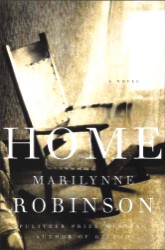|
Book Review
Home
Joan Frank
 Home is the place where, when you have to go there, They have to take you in," wrote Robert Frost. But at what cost, and to what end? This is but one of a welter of profound considerations in Marilynne Robinson's impossibly rich and beautiful new novel, touted as a companion to her prior, much-vaunted novel, "Gilead." In full disclosure, I confess to having been one of perhaps three people on Earth who did not initially succumb to "Gilead." The reason? Its voice - that of the Rev. John Ames, in a long letter to his young son - rang for me too cloyingly good, heavy with what Robinson herself calls, in "Home" (via a character's quip), "the odor of sanctity." Home is the place where, when you have to go there, They have to take you in," wrote Robert Frost. But at what cost, and to what end? This is but one of a welter of profound considerations in Marilynne Robinson's impossibly rich and beautiful new novel, touted as a companion to her prior, much-vaunted novel, "Gilead." In full disclosure, I confess to having been one of perhaps three people on Earth who did not initially succumb to "Gilead." The reason? Its voice - that of the Rev. John Ames, in a long letter to his young son - rang for me too cloyingly good, heavy with what Robinson herself calls, in "Home" (via a character's quip), "the odor of sanctity."
I put "Gilead" aside, but eagerly snatched it up again after reading "Home." As a deepening perspective, it proved terrifically satisfying. (For those who may not yet have read either, I recommend reading "Home" first.)
In "Home," Robinson enters at closer range to the story, told by Ames in "Gilead," of Jack Boughton: the 40ish, ne'er-do-well son of the widowed, dying pastor Robert. Old Robert has been the lifelong best friend of the aging Ames, who lives nearby with his much-younger wife and child. Jack, named for Ames, has been the hellion and scourge of a family of seven, plunging them into shame and tragedy after impregnating a local girl and disappearing for 20 years. Yet he is also his father's favorite; thus, the old man's greatest grief.
The era is that of the early 1950s - significant for its conservatism and unquestioned conformities. Glory, youngest of the (now grown and scattered) Boughton clan and recently humiliated by a failed marital engagement, arrives at the family homestead in bucolic, peaceful Gilead to care for her dying father. Soon thereafter she is joined by older brother Jack, a sweet, pained, gifted, convolutedly self-ironic loner. Never mind they grew up singing hymns at the piano; the Boughtons maintain a personal decorousness that, for modern Westerners, may approach pathology. ("Her family was slower to forgive a failure of discretion than they were to forgive most things actually prohibited in Scripture.")
After his 20-year absence, neither Glory nor the old man dares ask the underfed, penniless, miserable Jack, "What happened?" Instead, the three odd housemates attempt, quietly, heroically, to create a domestic life. Glory and Jack edge toward connection, but the going's excruciating. Secrets emerge, or half-emerge. Jack would like to relieve his father, family and disapproving Ames (rather shadowy in this rendering) of their dismay for him. Of all the grown children, Jack knows his Scripture best, but he's not a believer. Carrying a complicated, concealed burden, he longs to belong somewhere but cannot, for inarticulable reasons, get out of his own way.
Many of us have known a Jack Boughton, or been him. It is a mark of Robinson's extreme skill and imaginative empathy that we're given this lost, lovely man in marvelous, complex dimension. Perhaps anticipating the argument that any son of a near-saintly pastor and his "slightly self-enamored and distinctly clerical family" might well opt for a misfit's life, Robinson has also entrapped Jack in a somewhat more contemporary predicament (revealed toward the last) that compounds his "inaccessible strangeness" in an upright culture of "endless probity." One may wonder, mildly, whether a man like Jack might have fared better, say, as the son of cheerful atheists living in New York or San Francisco in the 21st century. Yet we recognize the brilliant, embattled self-saboteur in any era or circumstance.
In both "Home" and "Gilead," Robinson appears to be considering (among myriad themes and issues) the ravaging, irremediable loneliness of the unbeliever. She embeds her inquiry in a lode of theological history, and a nest of comforting physical details. "Home's" deepest pleasures may come from the exchanges (which form the novel's body) between Glory and Jack - tentative, difficult, sore with love, anguish, insight, told through Glory's exquisitely nuanced perceptions in clean, simple, luminous language. (Robinson's prose soothes and calms, itself a balm.) Jack strives to prove himself, relapses and self-lacerates, retriggering everyone's sorrow, not least that of a father who hardens as he diminishes - a spectacle so universal in its particularity it becomes nearly unbearable. We may hope, "Home" finally suggests, that things will one day settle, in unanticipated ways. Robinson loves the word "settle," and by it she does not mean resignation.
"Home" offers such intricate characterisations, so many passages of surpassing wisdom and beauty, one yearns to quote page after page. It rejoices in the humblest actions - giving a haircut, weeding, making meals, coffee - the holiness of the daily. As handily as it fits Frost's famous lines, "Home" also calls to mind those of the late, entirely unreligious E.B. White: "All that I ever hope to say, is that I love the world."
This review first appeared in The San Francisco Chronicle.
Copyright
(R) thedailystar.net 2008 |
